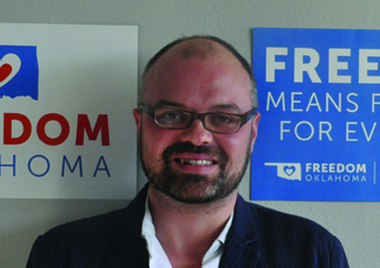Gay rights advocates anticipate court’s decision

By Janelle Stecklein | CNHI State Reporter, writer
OKLAHOMA CITY — Troy Stevenson admits his talents don’t extend to reading tea leaves. But as Supreme Court cases go, a much-anticipated ruling on same-sex marriage shouldn't be the biggest opinion of the summer.
Issues such as redistricting and access to healthcare should take center stage, he said.
It might seem like an odd statement from one of Oklahoma’s foremost advocates for lesbian, gay, bisexual and transgender rights. But Stevenson, who like thousands of others in the LGBT community is awaiting the court's opinion in Obergefell v. Hodges, said he believes — and hopes — it's a mere formality.
“I would be shocked if the decision was anything other than national marriage equality,” said Stevenson, executive director of the group Freedom Oklahoma.
No matter how the Supreme Court rules, nearly three-quarters of Americans — including half who oppose same-sex marriage — say they expect its "inevitable" legalization, according to a study released by the Pew Research Center last week.
“I think somebody would have to be living under a rock somewhere not to see the trend and what’s happening,” Stevenson said.
The non-partisan group's study noted “a dramatic shift" in attitudes about gay marriage. Support rose from 37 percent just six years ago to 57 percent this spring. Among those most supportive are millennials, who are ages 18 to 34, Democrats and the religiously unaffiliated.
A majority of mainline Protestants and Catholics support gay marriage now, too. So do a majority of whites and Hispanics, according to Pew.
The only age group whose members are “significantly" more opposed to gay marriage than not is the "silent generation" of adults, ages 70 to 87, Pew found.
“I think our culture in general has changed,” said Stevenson. “People are no longer demonizing these people.”
More people have come out of the closet since federal court rulings overturned gay marriage bans, Stevenson said. Same-sex marriage is now legal in three-dozen states, including Oklahoma, as well as the District of Columbia.
“It’s made people realize they don’t need to be ashamed of who they are,” he said.
The report's most surprising finding may be the support of 59 percent of people who live in states — such as Oklahoma — where gay marriage became law by court order rather than popular vote or an act of the legislature.
In the six months since a federal court effectively legalized gay marriage in Oklahoma, more than 3,000 same-sex couples have wed, Stevenson said.
“Oklahomans seem to have accepted it,” he said, adding that he's heard no allegations of discrimination against couples planning their nuptials.
It hasn’t been that way everywhere. There’s still outright defiance of court rulings in places including Alabama, he said.
Still, that hasn’t put a damper on the hope for legalization nationwide.
Christopher Stoll, a senior staff attorney for the National Center for Lesbian Rights, a California-based group that represented one of the plaintiffs in the Supreme Court case, said they're "quite optimistic" about the Supreme Court's ruling.
"I thought the arguments went really well,” he said. “We really hope that the Supreme Court will bring an end to these discriminatory laws, which help no one.”
While Stoll said he doesn’t anticipate a ruling against legalized same-sex marriage, should it happen, advocates will continue to fight in both the legal and political arenas to persuade more states to overturn laws that he considers discriminatory.
In the meantime, Stoll, his clients and LGBT advocates are waiting, hoping that same-sex marriage will be legalized nationally.
“Obviously we’re following all the issued opinions very closely,” he said. “We’ll be waiting as anxiously as everyone else for these final opinions to come down.”
Copyright 2015 www.mcalesternews.com





